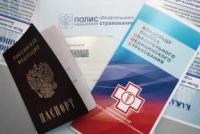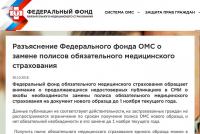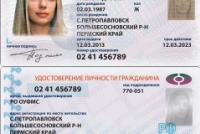Oms is regulated. Legal framework and regulation of VMI insurance. Medical insurance rules and contract features
The level of physical, mental and social well-being is defined as a person's health. The right to health protection and protection is enshrined in paragraph 1 of Article 41 of the Constitution of the Russian Federation.
Health is the highest good given to a person, without which everything else loses its meaning. Each person should take care of his own health, but society is also obliged to create conditions for the preservation and improvement of the health of its members. This set of measures is called medical care.
The Constitution of the Russian Federation declares human life and health as the highest value. Guided by this principle, emergency medical care in the event of a threat to human life is provided in the absence of a medical policy or other form of payment for this service.
Insurance plays an important role in the package of measures to protect the right to health.
Types of life and health insurance coverage... All citizens of the Russian Federation are members of the compulsory health insurance system (MHI). The relations in the system are regulated by Federal Law No. 326-ФЗ dated 29.11.2010. "On compulsory medical insurance in the Russian Federation."
The policyholders are: for non-working citizens - the executive committees of the constituent entities of the Russian Federation and self-government bodies. For the working population - organizations, enterprises, individual entrepreneurs and other individuals who have entered into labor and civil contracts involving remuneration.
The insurers are medical organizations licensed to provide health insurance.
Under the CHI program, citizens are provided free of charge:
· Emergency care in conditions threatening life and health caused by sudden illnesses, accidents, exacerbations of chronic diseases, difficult childbirth or complications of pregnancy;
Outpatient and polyclinic services, including prophylaxis, diagnostics, including in specialized diagnostic centers, treatment at home and in day hospitals;
· Inpatient care;
· Placement in isolation wards for epidemiological indicators;
· Planned hospitalization for diagnosis, treatment and rehabilitation;
· Help in case of pathology of pregnancy, childbirth and abortion;
· Assistance in the neonatal period.
The financial base of compulsory medical insurance is formed at the expense of insurers' contributions to the Federal Compulsory Medical Insurance Fund, as well as at the expense of receipts from business entities to the territorial compulsory medical insurance funds. Evasion of policyholders - enterprises or organizations, from paying insurance premiums or understating the base from which the premium is paid entail penalties.
Insurers interact with medical institutions and bear legal and material responsibility for the volume and quality of medical services they provide. In case of violation of the conditions for the provision of medical services, the insurer has the right to refuse to pay for services to the medical institution, or to make it in incomplete amount.
Compulsory health insurance standards regulate the financing of medical institutions of the compulsory health insurance system. According to the existing International Classification of Diseases ICD-10, for example, for influenza of any form, it is necessary to take tests and measure the temperature. Nothing else is included in the flu treatment program.
Earlier, until 2011, voluntary medical insurance (VHI) was regulated by the Law of the Russian Federation of 06/28/1991. No. 1499-1 "On medical insurance of citizens of the Russian Federation". In 2010, a new RF Law on CHI was adopted. In it, the issue of voluntary health insurance was not considered.
Currently, voluntary medical insurance is regulated by the provisions of the Civil Code of the Russian Federation on insurance and the Law of the Russian Federation of November 27, 1992. No. 4015-1 “On the organization of insurance business in the Russian Federation”.
Voluntary health insurance, where the insured is a natural person, as a rule, is also the insured, for a number of reasons has not yet become widespread. Low insurance culture, insufficient awareness of the population about the essence of the services offered, incompetence and insufficient professionalism of some insurers - these are the main reasons for the "underdevelopment" of this segment of the insurance market.
The situation is much better in relation to VHI, where the insured is a legal entity. In this case, the owner or administration of the enterprise receives a number of undeniable advantages. So, according to the Federal Law of the Russian Federation of 07.24.2007. "On Amendments to Part Two of the Tax Code of the Russian Federation" the amounts spent by the employer on employee insurance are charged to the payroll fund and are deducted from the tax base.
Insured employees who have the opportunity to receive medical care in medical institutions of the VHI system are more motivated to perform their duties in a quality manner and are loyal to the organization that provided them with this type of social package.
Some advantages of the VHI program:
· The ability to choose any medical facility within the provided price category;
· Round-the-clock opportunity to receive qualified advice by phone;
· The program may include a number of expensive diagnostic methods, such as computed tomography or magnetic resonance imaging;
· Dental care.
A clinic with a narrow specialization often has more modern and expensive equipment, in contrast to budget clinics. There are many options for the cost and volume of services provided in the VHI system.
Another type of protection for life and health. This is long term life insurance (DLI).
The essence of the proposal is that a citizen enters into a long-term contract (5, 10, 15, 20, 25 years, etc.) with an insurance company for the financial protection of life and health in the event of an accident that resulted in injury, disability or death of the insured person. There are programs for the provision of financial assistance for treatment, in the case of a diagnosis of a number of deadly diseases in the insured, such as cancer, heart attack, stroke, paralysis, coronary artery bypass grafting, organ transplantation, end-stage renal failure.
Upon successful achievement of the end of the insurance period, the client receives back the insurance premiums paid by him.
On January 1, 2011, the Federal Law "On Compulsory Health Insurance in the Russian Federation" dated November 29, 2010 No. 326-FZ came into force. Let's see what changes have taken place in the system of compulsory health insurance (hereinafter - CHI) and what are now the rights of citizens.
Rights and obligations of insured persons
Federal Law No. 326-FZ includes Russian citizens, foreigners (with temporary registration or residence permits), stateless persons and refugees (in accordance with Federal Law No. 4528-1 of 19.02.1993 "On Refugees") to insured persons.
The rights of all of the above persons are enshrined in Article 16 of Federal Law No. 326-FZ. So, insured persons have the right to receive medical care free of charge throughout Russia, but only in the amount established by the basic CHI program, and on the territory of the constituent entity of the Russian Federation in which the policy was issued - in the amount established by the territorial CHI program of this subject (clarify this by contacting your local Compulsory Health Insurance Fund or your insurance company).
There is the right to choose an insurance medical organization and replace it once a year, no later than November 1, or more often in case of a change of residence. To do this, you need to submit an application to the selected insurance organization.
Also, the insured person has the right to choose a medical institution from among those participating in the implementation of the territorial compulsory medical insurance program, as well as to choose a doctor, for which you need to submit an application personally or through your representative addressed to the head of the medical institution.
It also provides for the right to compensation for damage caused in connection with the failure or improper performance by an insurance or medical institution of its duties, to receive from the territorial fund, an insurance medical organization and medical organizations reliable information about the types, quality and conditions for the provision of medical care, to protect personal data.
However, along with rights, there are responsibilities.
Thus, insured persons must:
- Present a compulsory medical insurance policy when applying for medical care, except in cases of emergency medical care.
- Submit to an insurance medical organization personally or through your representative an application for choosing an insurance medical organization in accordance with the rules of compulsory medical insurance
(if you are already insured and have a policy, then if you do not submit an application, you will remain in the same insurance organization as before). - Notify the medical insurance organization about the change in the last name, first name, patronymic, place of residence within one month from the day when these changes occurred.
- To select an insurance medical organization at a new place of residence within one month in case of a change of residence and the absence of an insurance medical organization in which the citizen was previously insured.
CHI programs
The law provides for the development of basic and territorial compulsory medical insurance programs. Based on the norms of Art. 35 and Art. 36 of Federal Law N 326-FZ, the basic program is valid throughout the territory of Russia, and the territorial program is valid within the constituent entity of the Federation where the medical policy was issued, and the latter can be omitted if emergency medical care is required.
Thus, having a policy, you can get medical care throughout the Russian Federation, but only within the framework of the basic compulsory medical insurance program. You can get help under the territorial program only with a local policy.
Obtaining a policy
To obtain a compulsory medical insurance policy, you need to contact the insurance medical organization of interest with a corresponding application. If there is no such organization, then you need to contact the territorial compulsory health insurance fund.
On the same day, the insured person must be issued a policy or, in some cases, provided for by the rules of compulsory health insurance, a temporary certificate.
As for working citizens, the obligation to issue a policy remains with employers until May 1, 2011, and after that employees will have to receive policies on their own (Clause 4, part 1 of article 16, article 46 of the Law).
The insurance of children from the day of birth to the day of state registration of birth is carried out by an insurance medical organization in which their mothers or other legal representatives are insured, and after such registration - by an organization at the choice of one of the parents.
Announcement. Compulsory health insurance in the Russian Federation in 2020. Registration features and necessary knowledge.
Dear Readers! The article talks about typical ways of solving legal issues, but each case is individual. If you want to know how to solve your problem - contact a consultant:
APPLICATIONS AND CALLS ARE ACCEPTED 24/7 and WITHOUT DAYS.
It is fast and IS FREE!
Many citizens have already appreciated the value of compulsory health insurance. That is why, he does not save on his health and actively pays for the pole.
So what is compulsory health insurance in Russia? And what are the main nuances of this procedure?
What you need to know
In accordance with the law, all citizens included in the system have the right to receive free medical care throughout the Russian Federation.
How is the organization and financing of the fund
MHIF is an independent state credit company that implements state policy in the medical industry.
Such organizations are designed to accumulate insurance premiums, as well as to ensure financial stability.
This is already regulated by an additional agreement between the medical institution and the applicant.
In the clauses of the agreement, you need to display:
- date of conclusion;
- the name of the insurer;
- basis for activity;
- subject of the contract;
- the amount of medical care;
- date and signature.
Required documents
For registration you need:
- passport of a citizen of Russia;
- birth certificate, if it is a minor citizen;
- application of the established form.
For refugees, an additional certificate of recognition as such must be provided. The foreigner must provide a residence permit or passport.
Stateless persons must provide registration and passport details.
Calculation procedure
How to calculate compulsory health insurance, according to the Federal Law, payment for medical care is carried out after the medical organization provides a register of accounts and invoices for payment within the established limit.
Insurance Company:
- submits to the territorial authority an application for receiving targeted remuneration with an advance payment;
- submits an application for an amount for services rendered.
Then the territorial authority considers the application and satisfies it, transferring the required amount.
Details about insurance premiums for compulsory health insurance (CHI)
The duration of the settlement period is determined for each year of the worked time. Accrual in accounting is exactly the same.
The duration of the service is the entire life of the insured person. Paying insurance premiums - an individual or an employer.
If a person is not employed, then he can independently contribute money to the FSS. Insurance premiums are credited to the federal fund.
The compulsory health insurance policy provides access to free health care services. But does everyone know what opportunities the compulsory medical insurance policy provides, what is included in the free service, what types of examinations and operations can be carried out?
Legislative acts regulating the CHI system
Free health care services are provided under compulsory health insurance. The CHI system guarantees citizens equal rights to receive medical services. It is regulated by a number of normative legal acts:
- law No. 326-FZ "On Compulsory Medical Insurance in the Russian Federation";
- government decree No. 1403 "On the program of state guarantees for free provision of medical care to citizens for 2017 and for the planning period of 2018 and 2019", which contains the basic compulsory medical insurance program. This document, in particular, explains what is included in the MLA in 2017;
- a number of other acts that allow citizens to receive the minimum guaranteed volume of services.
Who is eligible for free health care?
Both Russians (indefinitely) and stateless persons of the Russian Federation (with a limited period of validity) can get a compulsory medical insurance policy. The presence of this document means that the patient is under the protection of the insurance company with which he entered into a contract.
Medical care is carried out by the healthcare organization (both public and private institutions participate in the CHI system) to which the patient is attached. At the same time, he has the right to change the clinic and the attending physician once a year and an unlimited number of times - when moving to another place of residence. Once a year, it is allowed to change the insurer, this must be done no later than November 1.
List of services under the compulsory medical insurance policy
What types of medical care are available under the policy, does it include high-tech diagnostic methods, is MRI included in the list of free compulsory medical insurance services?
The legislation provides for the following forms of medical care:
- emergency (ambulance);
- outpatient, including examinations (the basic list includes MRI, ultrasound and endoscopic methods (gastroscopy, colonoscopy, etc.);
- stationary:
- in cases of exacerbation of diseases;
- referral to treatment and operations (among the available services - chemotherapy, removal of prostate adenoma, treatment of diseases in gynecology, etc.);
- medical services for pregnant women, as well as childbirth, recovery after them, abortion;
- when intensive therapy is required (in case of poisoning, severe injuries);
- high-tech;
- palliative.
The last item on serious illness was added in 2017. In total, the basic list includes about 20 cases for which free medical care is available.
Is it allowed to carry out therapeutic massage, remove papillomas, warts - are such procedures provided by the compulsory medical insurance policy, which is included in the program? Taking a massage course at no cost will allow the availability of indications for the procedure. As for skin defects, the operation will be performed free of charge if the growth is bleeding or damaged, that is, there is a danger to the patient's life and health.
Within the framework of the CHI system, there are basic and territorial programs: the first is applied throughout the country, the rest - within a specific constituent entity of the Russian Federation. The list of services for regional programs is wider. Some of them provide free tests for chlamydia and spermogram, some allergy tests (such types of examinations, for example, are carried out under the compulsory medical insurance policy in Moscow, in the Moscow region and in St. Petersburg).
From time to time, the media report on public initiatives to add or delete a particular service from the list. For example, earlier proposals were discussed to exclude abortion from the compulsory medical insurance system and include the work of a nutritionist in it, but they did not find reflection in the legislative acts.
Dental services under the compulsory medical insurance policy
Is free dentistry available under the compulsory medical insurance policy? This question is of interest to many, since the services of dentists, as you know, are not cheap. So, what opportunities does dentistry provide under the compulsory medical insurance policy, what is included in the free service?
A visitor to a clinic participating in the CHI system can expect:
- for an appointment, examination and consultation;
- for the prevention and treatment of inflammation of the oral cavity;
- for filling teeth;
- for surgical intervention (tooth extraction, abscess opening, etc.);
- for an x-ray examination.
Please be aware that there are also restrictions on dental services. For example, filling will not require a fee if cement is used during the treatment. But the light seal will not be delivered free of charge.
Certain services are possible if there is a referral, for example, the surgeon will cut the frenum of the tongue upon presentation of a certificate from the orthodontist.
How to find out if a service is included in the CHI program?
Information on services rendered free of charge is contained in the regulatory documents adopted in a particular subject. A detailed list is also provided by health care institutions and insurance companies operating in the CHI system.
The list of compulsory medical insurance services on the official health care website in 2018 is absent, but from the resource of the Ministry of Health you can go to the MHIF website, where all the regulations relating to the compulsory health insurance system are posted.Voluntary health insurance (VHI) makes it possible to receive additional medical services and emergency assistance in those areas of health protection that are not provided by the CHI. There is no law on voluntary health insurance yet, but there are related legal acts regulating this area of \u200b\u200binsurance. In the event of contradictions in the implementation of one or another VHI program, as well as in resolving disputes between the insurer and insured persons, lawyers use several legislative acts, federal laws and articles of the Civil Code of the Russian Federation at once.
Legislative regulation
Clause 1 of Article 41 of the Constitution of the Russian Federation establishes that “everyone has the right to health protection and medical care”. Compulsory medical insurance (compulsory medical insurance), financed from the state budget or the budgets of the constituent entities of the Russian Federation and other sources, guarantees assistance in emergency situations that threaten human life, and should be provided even in the absence of a policy, free of charge.
Until January 2011, insurance activities in the country were regulated by the Law of the Russian Federation No. 1499-I of June 28, 1991 "On medical insurance of citizens in the Russian Federation" (last edition of 07.24.09). He defined the basic concepts, rules, participants and their interaction, regulated the work of insurance companies and medical institutions. The law considered VHI as an additional type of insurance to the CHI. With the termination of this document, voluntary medical insurance has become an independent activity. And on January 1, 2011, Federal Law No. 326-FZ of November 29, 2010 "On Compulsory Health Insurance in the Russian Federation" came into force, affecting the following issues:
- Definition and principles of the CHI system;
- The role of the state and subjects of the Russian Federation in insurance;
- Interaction between parties to a medical insurance contract;
- Sources of financing for CHI;
- CHI programs and services included in them;
- Contractual relations between insurers, policyholders and healthcare facilities;
- Control and supervision.
However, this Federal Law does not address voluntary health insurance, therefore, most litigation and the rest of the legal practice in the field of voluntary medical insurance are based on scattered legislative acts, as well as on the Insurance Rules, which are developed by the insurer itself, the association of insurers or the state. Usually, such rules stipulate the main provisions of the health insurance contract.
What is VHI regulated by?
To date, the rules governing voluntary medical insurance, or rather their individual parts, terms, concepts and some legal situations can be found on the pages of two main acts - in the Civil Code of the Russian Federation and the Law of the Russian Federation No. 4015-1 of November 27, 1992 "On the organization insurance business in the Russian Federation ”. So, the main issues of insurance are considered in the second part of the Civil Code of the Russian Federation (Chapter 48). In accordance with clause 1 of Article 927 of the Civil Code of the Russian Federation, insurance is carried out on the basis of contracts “concluded by a citizen or legal entity (insured) with an insurance organization (insurer)”. Articles 934 and 940 introduce the concept of “personal insurance contract”.
In accordance with it, the insurer must pay for medical services provided to the insured person upon the occurrence of an insured event in an amount not exceeding the insured amount, and the insured must pay insurance premiums. The contract is concluded in writing. Article 942 contains the essential terms of the contract: the insured person (the policyholder or another person can become it), insured events, the amount of insurance, the term of the contract. According to article 943, the terms of the contract are determined by the rules in force in the insurance company (or the union of the insurance company), and the policyholder and the insurer can "agree on amending or excluding certain provisions of the insurance rules and on supplementing the rules."
Law of the Russian Federation No. 4015-1 covers issues such as the goals of insurance, participants in insurance activities, and offers basic definitions: insurance risk, amount, premium, tariff, case, financial support of insurance companies, insurance supervision. According to Law No. 4015-1, the insurance rules have the force of an internal regulatory document of the insurance company and must be observed by both parties to the contract. In addition, the documents signed by the parties to the transaction on the implementation of voluntary medical insurance have legal force.
Medical insurance rules and contract features
The relationship between the insurance company and the policyholder is determined by the contract and insurance rules. These documents are of great importance in resolving disputes. At the time of execution of the contract, the insured must carefully read the conditions and principles of the insurer's work, check that all the necessary points are indicated in the agreement. The insurance rules and the composition of the VHI contract for most insurers are largely similar, and they contain:
- Basic terms;
- Participants and objects of medical insurance;
- Definition of insurance risk and event;
- Sum insured and contributions of the policyholder;
- Conditions for the conclusion and termination of the contract, validity period;
- The rights and obligations of the participants;
- Insurance payment;
- Personal information;
- Dispute resolution;
- Other conditions.
In accordance with the Rules, a voluntary medical insurance agreement is drawn up, which defines the procedure and conditions for receiving medical services by the insured person. It is agreed and signed by both parties. The main sections of the document include information about the policyholder, insured persons and the insurance company; insurance program; composition of services, procedure and time of their receipt; medical organizations; the procedure for paying insurance premiums; insurance amount; responsibility and rights of participants. In addition to these sections, the contract must also have sheets with attachments. They include all the necessary additions, as well as non-standard solutions or services for a specific policy. In addition, the applications detail the VHI programs, the rates of the insurer, the appearance of the policy. A medical questionnaire is attached to the document, if necessary.
















